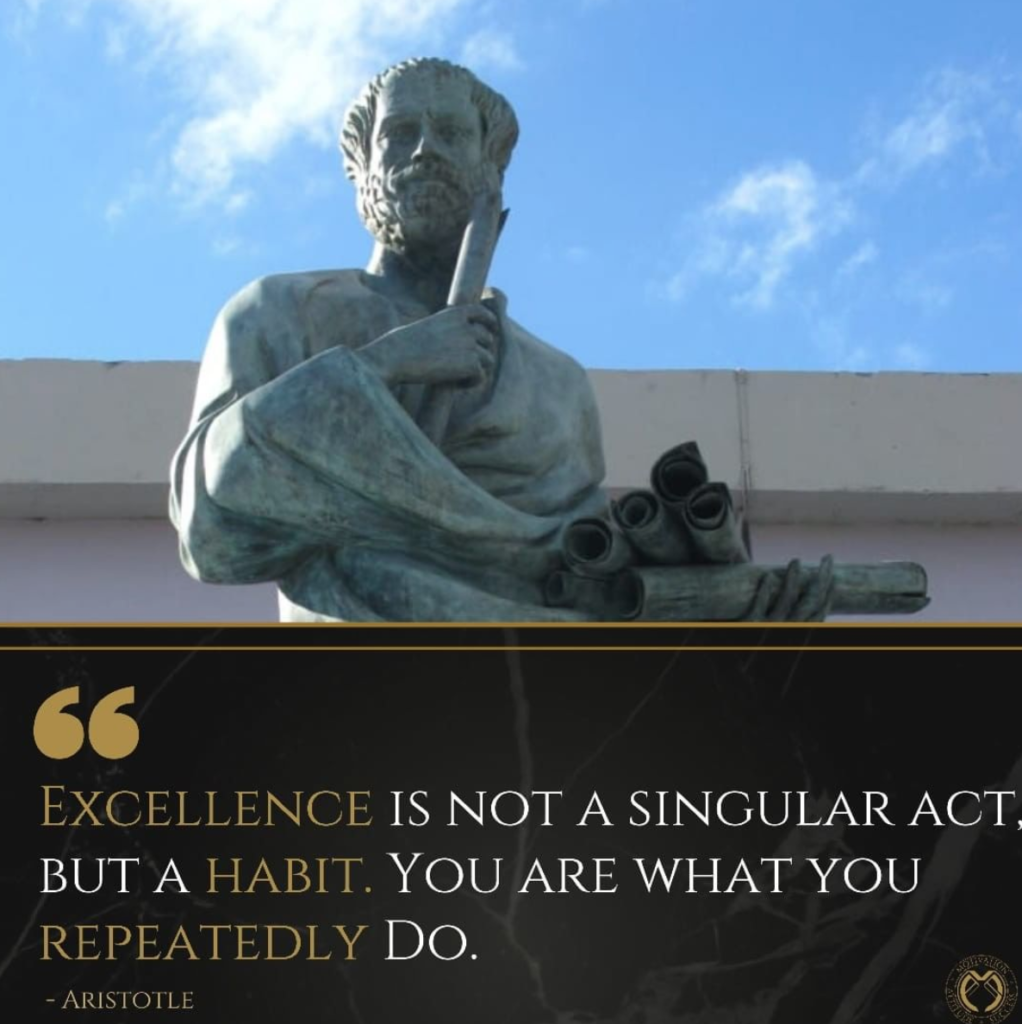Aristotle’s Idea of a Flourishing Life
One of my new favorite websites is The Art of Manliness. Now women, please don’t think that this post is just for men. This website promotes skill and values closely linked to the traditional concept of “manliness” but many of their articles (except maybe those on style) apply to women. For example, I read an article titled “Aristotle’s 11 Excellences for Living a Flourishing Life.” I think there’s something we can learn from it about how to live a good life by living one of value. Here’s a brief explanation of what Aristotle meant by “flourishing” and “virtue” from the article:
For the ancient Greeks, eudaimonia was considered the highest human good. While the word doesn’t easily translate into English, it roughly corresponds to a happy, flourishing life — to a life well-lived.
Eudaimonia wasn’t a destination — a nirvana that, once reached, initiated a state of bliss. Happiness wasn’t something you felt, but that you did; it was a dynamic, ongoing activity.
What that activity centered on was the pursuit of arete, or virtue.
We tend to think of “virtue” in an exclusively moral sense, as having to do with qualities like courage, compassion, and continence. But for the Greeks, virtue meant doing anything well. Courage was a virtue, but so was speaking articulately. Playing an instrument masterfully was a virtue. Strength was a virtue. Beauty was a virtue.
The Art of Manliness
Aristotle’s 11 Values
In summary, Aristotle’s 11 values are:
- Excellence in Morals
- Excellence in Judgment
- Excellence in Health and Fitness
- Excellence in Attractiveness
- Excellence in Wealth
- Excellence in Honor
- Excellence in Organization
- Excellence in Family Life
- Excellence in Intellect
- Excellence in Public Speaking
- Excellence in Friendship

Granted, not all these values are Christian values. For example, attractiveness can lead to vanity. And wealth can lead to greed. But it doesn’t mean we shouldn’t work hard to earn money and provide financial security for ourselves and our families. When we have a certain amount of wealth, we can also be more charitable towards others. And while health and attractiveness are different values according to Aristotle, I consider them linked. Healthy people are generally more attractive.
The Importance of Values
We may have different values than Aristotle. But we can both agree that we need to hold values to lead a flourishing life. The idea is that we need to focus on pursuing excellence in various areas of our lives. I think we’ve lost that drive for excellence as modern society has made it easier to fulfill basic needs of food, cheap goods, and entertainment. But Aristotle and the Catholic Church will tell you that you need to strive for more than just basic wants and desires.
Look at the saints. No one can accuse them of not striving to live up to certain virtues and standards. They weren’t lazy or aimless. They focused on living in God’s grace and doing his will. They had their weaknesses but they didn’t let those weaknesses detract them from living a full life. This is why we call on saints in our prayers; so we can imitate them in living in a complete way. That way will be different for each one of us.
What are Your Virtues?
I think it’s a good exercise to contemplate what values you desire to excel at. Remember, excellence isn’t a destination, it’s an ongoing process. We’ll never be fully “excellent” until we live with God in Heaven. But we can always strive to have a little taste of that excellence. That’s really what God’s grace is — a taste. Here are the core virtues I try to excel at daily. What are yours?
- Excellence in mind — always developing new skills and learning new things.
- Excellence in spirit — always connecting with God through prayer.
- Excellence in body — staying healthy and avoiding unnecessary risks.
We can often become discouraged when trying to live virtuously. After all, it’s not easy. Many times, it’s hard to drive towards loftier goals when our base desires are satisfied. It’s hard to find the will to exercise when watching a football game with a refreshing beer is readily available. It’s hard to read a book when you can binge-watch a series on a streaming service. But this is why we have tools like the Rosary.
How the Rosary Helps Us Flourish
Mary promises us that when we pray the Rosary we will desire heavenly things. Not only that, she promises us all that we shall obtain all that we ask by reciting the Rosary. We have all the tools we need through the rosary to achieve excellence in various virtues. We just have to know what we want, or rather, what God wants of us. When we know them, Mary and the saints will help us find them when we make the effort.
I’m reminded of what I tell my boys every day when we pray in the morning while driving to school — don’t pass up the best help you will receive all day. Of course, I mean asking for God’s help in making the day a good one. It’s not about getting what we want or some obstacle being magically removed (although I won’t pass up the occasional miracle). It’s about God helping us excel in virtue. When you commit to a life of virtue with God’s help, the actual details of the day will work themselves out according to His will.

